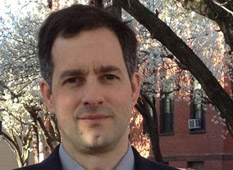Faculty Forum Online: What Clouds Say about Climate Change, Nov. 15, 2012
-
-
slice.mit.edu
- 1
Filed Under
Recommended

Update: View a video of this presentation.
What happens when particles in the atmosphere, especially manufactured ones, interact with water vapor and temperature to form clouds in a changing climate?
That is the question that Dan Cziczo, associate professor of atmospheric chemistry, explores. In brief, clouds help offset warming from greenhouse gases and the production of clouds help cool the earth, but in a shifting climate, cloud changes can be volatile.
Cziczo, part of MIT's Program in Atmospheres, Oceans, and Climate, will explain the connection between clouds and climate change as well as the impact of particulate matter and aerosol particles and take questions from the worldwide MIT community via video chat on Thursday, Nov. 15 from noon to 12:30 p.m. (EST).
Register for this free event—Cumulus, Cirrus, Stratus: What Clouds Say about Climate Change—to receive the link for live viewing. After the event, return to the Slice of MIT blog and continue the conversation in the comments.
About Dan Cziczo
 Dan Cziczo is an atmospheric scientist interested in the interrelationship of particulate matter and cloud formation. His research utilizes laboratory and field studies to elucidate how small particles interact with water vapor to form droplets and ice crystals.
Dan Cziczo is an atmospheric scientist interested in the interrelationship of particulate matter and cloud formation. His research utilizes laboratory and field studies to elucidate how small particles interact with water vapor to form droplets and ice crystals.
Cziczo's research group focuses on Earth's radiative budget, meteoritic debris, vehicles emissions, and the effect of atmospheric aerosols on cloud formation mechanisms. He holds a bachelor's degree from the University of Illinois at Urbana-Champaign, and a master's degree and doctorate from the University of Chicago.
RELATED Introducing: Atmospheric Chemist Dan Cziczo [youtube http://www.youtube.com/watch?v=RMXqxctoryM&w=425&h=239]
Vergano, D. "Scientists weigh geoengineering in global warming battle," USA Today








Comments
Suqin Duan
Thu, 11/15/2012 12:45pm
I am an atmospheric undergrad. It's great to have a shot of the faculty forum!
I have some questions for representation of clouds in climate models. Does the uncertainty mainly come from the dynamic, physical processes, or interactions with chemicals? As for the confidence of cloud-modeling, how much space is there for us to improve, as it is so complex and so uncertain? Will the parameterization be endless trials?